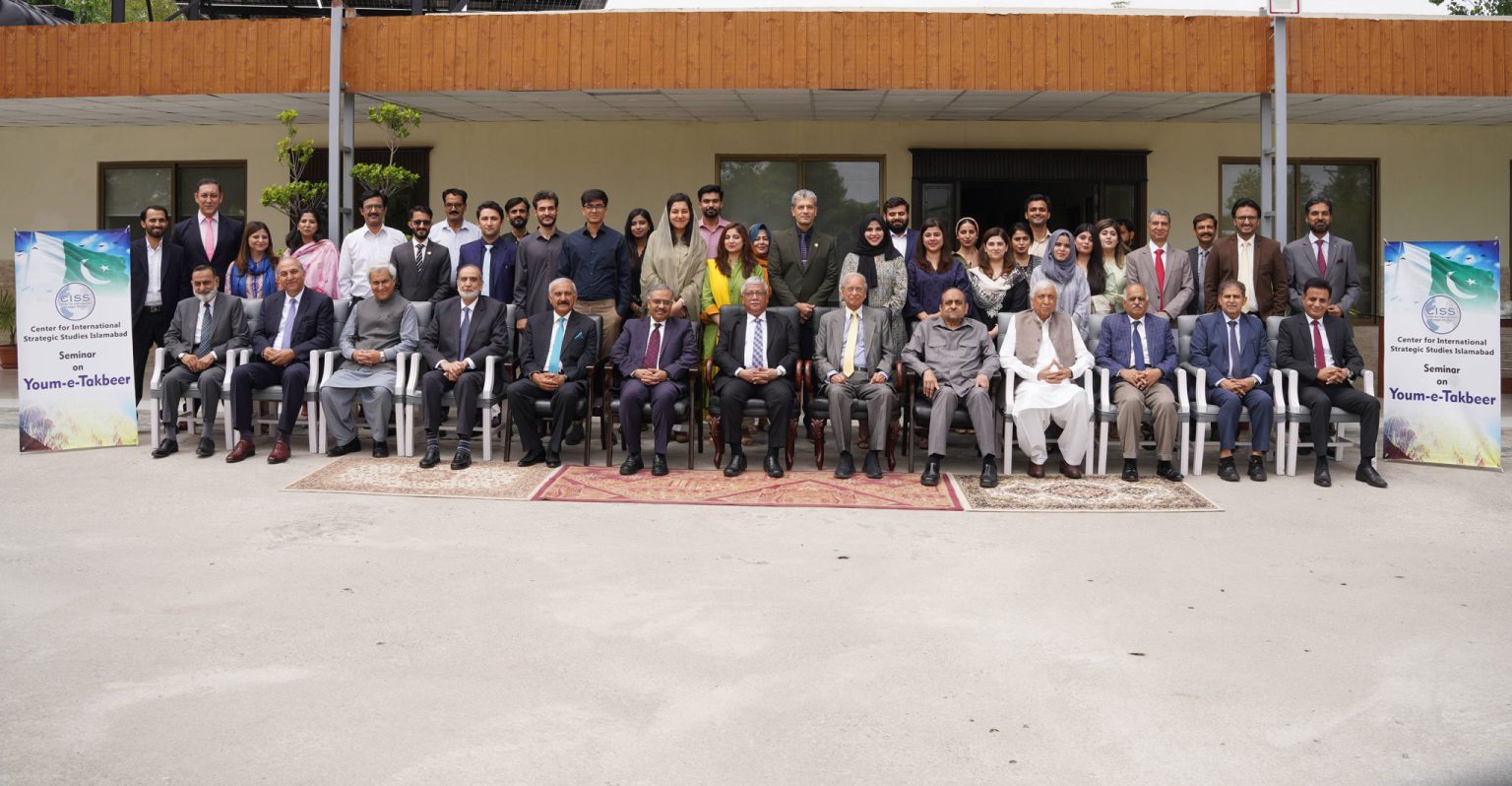Press Release
The Center for International Strategic Studies (CISS), Islamabad, hosted a seminar titled “Pakistan’s Nuclear Weapon Program – Guarantor of Peace and Stability in South Asia” to commemorate the 27th anniversary of Youm-e-Takbeer on May 30, 2025. Lieutenant General (Retd.) Khalid Ahmed Kidwai, NI, HI, HI (M), Advisor to the National Command Authority (NCA) and former Director General of the Strategic Plans Division (SPD), delivered the keynote address.
The seminar speakers included Ambassador Sohail Mahmood, Director General of the Institute of Strategic Studies Islamabad (ISSI)and former Foreign Secretary of Pakistan, Mr Muhammad Naeem, former Chairman of the Pakistan Atomic Energy Commission (PAEC), Dr. Adil Sultan, Dean Air University, Islamabad, and Brigadier (Retd.) Dr Zahir ul Haider Kazmi, Advisor on Arms Control, SPD. The seminar highlighted the strengths of Pakistan’s nuclear program and reaffirmed its unwavering resolve to maintain strategic stability in South Asia, emphasizing that a credible and fully operational deterrent remains central to regional peace and security.
Highlighting the role of scientists in making Pakistan a nuclear weapon-capable state, speakers underscored that Pakistan’s nuclear program was made possible by an exceptional cadre of scientists, engineers, and strategic planners who turned an overwhelming challenge into reality. Despite embargoes, financial constraints, and geopolitical isolation, they devised indigenous solutions, secured vital materials, and built a self-reliant nuclear infrastructure. Their efforts, spanning uranium enrichment to missile integration, culminated in the 1998 nuclear tests. More than a scientific feat, it became a symbol of national resilience and technological sovereignty, ensuring Pakistan’s security against nuclear coercion.
Regarding the recent India-Pakistan crisis, the speakers noted that India has shown a pattern of conducting false flag operations as a casus belli to justify aggressive actions against Pakistan, disregarding the prevailing nuclear environment and deliberately testing the limits of Pakistan’s conventional capabilities and nuclear thresholds.
In response to India’s Operation Sindoor, Pakistan undertook kinetic retaliatory measures under Operation Bunyanum Marsoos. The success of Operation Bunyanum Marsoos reestablished deterrence, restored strategic stability and redefined the regional balance in Pakistan’s favor. This recent intense escalation-cum-retaliation mini war between India and Pakistan proved decisive, marking a major paradigm shift. It showcased Pakistan’s credible nuclear capability and reaffirmed that this deterrent—operationalized through Full Spectrum Deterrence (FSD)—serves as the cornerstone of peace and strategic stability in South Asia.
The speakers asserted that if India persists in its reckless behavior, it must recognize that Pakistan possesses a comprehensive set of both kinetic and non-kinetic options to deliver a decisive response. Pakistan’s resolve must not be underestimated. The Pakistan Air Force will continue to assert its dominance in South Asian airspace. It would be in India’s interest to acknowledge the limits of its power and act accordingly.
The speakers observed that the new normal in South Asia, following the recent crisis, is that any conventional aggression by India against Pakistan will provoke a Quid Pro Quo Plus (QPQ+) response—one that is precise, immediate, and proportionate—compelling India to seek a ceasefire. The speakers concluded that Youm-e-Takbeer symbolizes more than a technological milestone. It reflects Pakistan’s unwavering commitment to maintaining peace through Credible Minimum Deterrence (CMD). Pakistan’s nuclear weapon program was—and has now once again proven to be—the sole guarantor of peace and stability in South Asia.
Media Coverage
The News
https://www.thenews.com.pk/print/1317073-nukes-sole-guarantor-of-regional-peace-nca-adviser
Dawn
https://www.dawn.com/news/1914443
Business Recorder
https://www.brecorder.com/news/40365529

